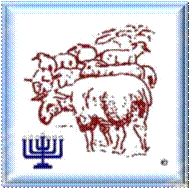THE FARMER
AND
THE WOLF
-A PARABLE-
By Yehoshua Mizrachi, Arutz Sheva
Once upon a time, a man and his family moved back to their long abandoned ancestral farm. After much backbreaking work, the man reclaimed the fields from the overgrown weeds, and reintroduced the bleating of sheep and the mooing of cows to the lonely prairie. He patched up the roof of the stately old farmhouse and settled in to the bucolic life of the farmer.
One morning, he awoke to find his fields trampled and his Iambs dead. "Who could have done this?" he asked aloud.
"I did," said a wolf standing not far away. "Why?" the farmer asked the wolf.
"Because I destroy, that is how I survive. Before you returned, we wolves had the entire untamed prairie to ourselves."
"But my farm is only a small corner of the prairie. Surely we can find a way to live together in peace."
“We cannot live in peace. You have brought order and beauty to the land. You are not welcome here. Only when the prairie is chaotic and untamed can we rule."
As the farmer reached for his shotgun, Brother Simon, who was standing in the safety of the stately old farmhouse, said to his father, "The poor wolf is not our natural enemy. He is hungry and does not understand our ways. Let us bring him into the house, feed him and warm him by the fire. Then he will understand, and we will share the prairie in peace:'
The farmer thought about this idea for a moment. He certainly didn't want his crops ruined and his livestock murdered; after all, he had returned to the family farm to live the bucolic, peaceful life of a farmer.
The farmer said, "ein breirah," (no choice) so they invited the wolf into the stately old farmhouse. They fed him their table scraps and more besides. At the end of the evening, they tucked him into a cozy dog bed by the warm stove and bid their new friend a good night.
The farmer awoke in the morning to find the furniture demolished, his table smashed and his porcelain shattered. "Who could have done this?" he asked aloud.
"I did," said the wolf, standing not far away.
“Why?" the farmer asked the wolf.
"Because I destroy, that is how I survive. Before you returned, we wolves had the entire untamed prairie to ourselves."
"But my farm is only a small corner of the prairie. I thought we were trying to find a way to live together in peace."
"You were trying, not me. We cannot live in peace. You have brought order and beauty to the land. Only when the prairie is chaotic and untamed can we rule."
“Then leave my house!" demanded the farmer.
"You have invited me in, so I am not leaving," said the wolf. "It is you who are not welcome here."
Brother Simon said to his father, "This destruction is really our fault, not his. We have failed to explain the clear advantages of our ways. Anyway, he will not leave and we cannot throw him out, for he will go back to killing our sheep. Our only choice is to domesticate him. Then he will understand, and we will share the prairie in peace." "Ein breirah," (no choice) the farmer sighed.
That night, they tried harder. They gave him a place at the table, served him their best food and warmed him by the big fireplace in the den. At the end of the evening, they tucked him into a beautiful four-poster bed with fine satin sheets and bid their new friend a good night.
The farmer awoke in the morning to find the wolf leaning over the baby's crib. His snout was red with fresh blood. "How could you do this?" he shrieked at the wolf.
"Don't you listen? I told you before: I destroy, that. is how I survive. Before you returned, we wolves had the entire
untamed prairie to ourselves."
"But my farm is only a small corner of the prairie. I thought we were trying to find a way to live together in peace..”
"Don't you listen? We cannot live in peace. You have brought order and beauty to the land. Only when the prairie is chaotic and untamed can we rule."
"Then leave my housel" demanded the farmer.
"I am now a domestic wolf," he said, "and this is now my house. It is you who are not welcome here."
So the farmer called the local game warden, who also happened to be his ol Uncle George, to come remove the wolf. When Uncle George arrived, the farmer explained. 'We returned to the family farm to live the bucolic, peaceful life of farmers."
“I know." said ol' Uncle George.
"Then this wolf arrived, trampled our fields and killed our Iambs," continued the farmer.
"You're right," said ol' Uncle George.
"Then he destroyed my peaceful home and killed my child," said the farmer.
"Terrible," ol' Uncle George said, slowly shaking his head.
"This is unreal! It must come to an end " screamed the anguished farmer.
"You're right again," nodded Ol" Uncle George.
"So, you agree to kill the wolf Uncle George?"
"Oh, no - can't do that. State laws against it. Besides, we'd have those PETA people on our backs.
Nope, “ein breirah” (no choice)
What you need is a better class of wolf. The only way to resolve this is... to teach that wolf some manners, so that the two of you can share the house in peace. I can arrange for three lessons at Monsieur Jacques' finishing school for wayward wolves..."
Dear friends, who will write the end of this story - the farmers or the wolves?
Yehoshua Mizrachi lives on the Farm.
Return to: L'Chaim - To Life! Page
To return to Menorah's Publications PAGE
To return to Menorah's Web Page



